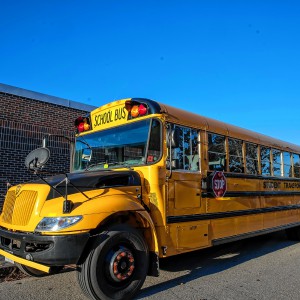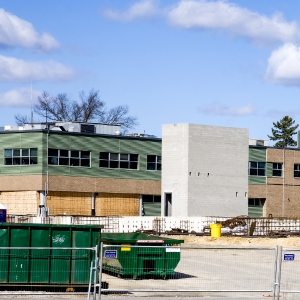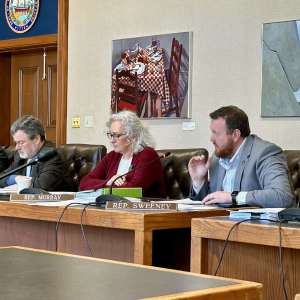Generational divide begins to emerge over Concord School Board charter amendments
|
Published: 09-10-2024 12:47 PM
Modified: 09-12-2024 4:07 PM |
Editor’s note: This story has been updated to reflect the Concord School Board’s position that the charter amendments need a three-fifths vote to pass.
Nicole Fox, the mother of three children in the Concord School District, believes the Concord School Board erred when it decided last December to build the district’s new middle school on the city’s East Side rather than in its current location.
But, unlike the many Concord residents who share that view, Fox opposes a pair of amendments to the school board’s charter that could re-open that decision.
“Years ago, I had hoped that two of my children might get to attend the new school, but the delays already experienced have made that a laughable idea,” said Fox, whose youngest child is in seventh grade. “The school is desperately needed and should not be delayed any further.”
Jim McConaha, a Concord resident for about 50 years, disagrees.
“It’s never too late to walk away from a bad decision,” he said.
The differing views of Fox – a young parent – and McConaha – an older resident without school-aged children – epitomized a generational divide that began to emerge during a hearing Monday night about how much authority the school board should have to make decisions without first receiving voter approval.
Concord’s school board is currently the only one in the state that operates entirely autonomously, meaning that it doesn’t need the approval of the City Council or voters to pass its budget, raise taxes or issue bonds to build new schools. The charter amendments – which will be on the November voting ballot for residents of the school district – stand to change that.
Article continues after...
Yesterday's Most Read Articles
 House committee defunds relief program for mothers and children, spares SNAP incentives
House committee defunds relief program for mothers and children, spares SNAP incentives
 No high-speed E-ZPass at Hooksett tolls for at least two months
No high-speed E-ZPass at Hooksett tolls for at least two months
 New Hampshire law enforcement to step up traffic enforcement on Route 106
New Hampshire law enforcement to step up traffic enforcement on Route 106
 Schools in Lakes Region explore creating a special education school to bring down costs
Schools in Lakes Region explore creating a special education school to bring down costs
 Work continues on new state psychiatric hospital in Concord
Work continues on new state psychiatric hospital in Concord
 House committee reverses vote, adopts prohibition on DEI activities and spending
House committee reverses vote, adopts prohibition on DEI activities and spending
The first amendment would require a district-wide vote before any school building is relocated, while the second would call for a vote whenever the school district wants to sell its property.
Though the push to get the amendments on the ballot was motivated by disapproval over the middle school location decision, a question remains whether the amendments would retroactively apply to that decision if they were approved in November.
“My opinion is it probably would not” apply retroactively, school board member Bob Cotton said Monday. “The potential again rises that there could be a further delay as a result of litigation over whether the amendment would have retroactive effect.”
Of the 30 people who testified Monday, 19 opposed the amendments and 11 supported them. The majority-held opposition represented a departure from the vocal calls to re-visit the middle school decision that have permeated the city for the last several months.
Of the 19 in opposition, 14 identified themselves as parents of children in the school district currently. Of the 11 in favor, only one did.
Like Fox, parents of school-aged children argued that a delay could prevent their children from experiencing the new middle school building. But others made a more philosophical argument about the purpose of a school board.
“I trust this board because these individuals dedicate so many hours looking into these issues, and I think they’re the right people to making these decisions,” said Rob Dietel, the parent of children at Rundlett and the McAuliffe Schools.
Proponents of the charter amendments countered that the school board had lost that trust.
“The sole decision-making power of a board may work well . . . when all involved parties believe that the other parties involved are trustworthy,” said Rebecca Maccini. “The time has come, I believe, when all parties affected by the decisions of the Concord School Board have less trust in one another.”
The charter amendments were proposed in May by a community group called the Concord Concerned Citizens, whose members have argued that relocating the middle school would be more expensive than rebuilding at the current site, would cause traffic and safety issues, and would negatively affect the environment and habitat at the new site.
This spring and summer, they gathered over 1,500 signatures from residents, surpassing the threshold of approximately 1,050 needed to get charter amendments on voters’ ballots.
The Concord Citizens group maintains a simple majority on Concord voters will pass the amendments in November, however, the school board does not agree.
After a change to the charter in 2022, the amendments require a three-fifths majority to pass, according to School Board President Pam Walsh, citing advice from the district’s attorney. The revision supersedes state law which requires only a simple majority for amendments to pass, the school district has said.
The school board has been working with a design firm for several months and has said that starting over in a new lo cation would waste money already expended and delay the project – though it is unclear by how much. The board has also said that starting over could put the district at risk of missing out on state building aid, though the rules will allow Concord to pass on aid without losing its spot in line.
Construction on the project, which has been capped at $152 million, would not begin until January 2026 and would not be completed until the summer of 2028 under the current timeline.
Jeremy Margolis can be contacted at jmargolis@cmonitor.com.










 Henniker ponders what is a ‘need’ and what is a ‘want’
Henniker ponders what is a ‘need’ and what is a ‘want’ Boscawen residents vote to fund major renovation of public works building
Boscawen residents vote to fund major renovation of public works building ‘Voting our wallets’: Loudon residents vote overwhelmingly against $1.7M bond for new fire truck
‘Voting our wallets’: Loudon residents vote overwhelmingly against $1.7M bond for new fire truck In Pembroke, Education Freedom Accounts draw debate, voters pass budget
In Pembroke, Education Freedom Accounts draw debate, voters pass budget
